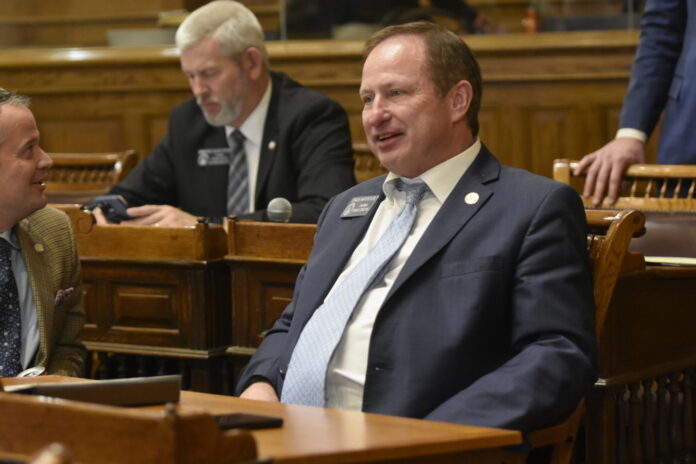
ATLANTA (Georgia Recorder) — A Georgia consumer utility office that fell victim to Great Recession-era state budget cuts in 2008 is getting another push this year from a bipartisan group of Georgia lawmakers to re-establish an independent advocate for residential and small business owners in utility rate cases.
The Senate Rules Committee could decide in the coming days whether Senate Bill 94 advances before the full chamber for a vote to form an Office of Consumers’ Utility Counsel that would participate in utility proceedings before the Georgia Public Service Commission and other agencies.
Georgia’s new utility consumer advocacy office would operate under the Georgia Attorney General’s office, and would re-establish a former Consumers’ Utility Counsel that was abolished in statewide budget cuts mandated by Gov. Sonny Perdue during the 2008 economic freefall.
The five-member PSC regulates Georgia Power and a number of other public utilities that provide electricity, natural gas and telecommunications services. The commission has limited authority over the more than 90 electric membership cooperatives and municipal gas and electric companies located throughout Georgia.
Sen. Chuck Hufstetler, a Rome Republican who is sponsoring the bill, said it is estimated to cost less than $1 million to re-establish the consumer utility staff, which he said is a small price to pay for the state to provide legal and financial resources to protect consumers on utility cost issues.
The budget would be used to hire a director and other staff and compensate consultants and other experts in utility matters. The legislation proposes to empower the director to initiate utility proceedings with state and federal agencies and to represent consumers in court cases.
The director would be authorized to take depositions and obtain other evidence in utility proceedings that is not considered confidential information.
The bipartisan bill, signed by two dozen senators, advanced last week through the Senate Regulated Industries and Utilities Committee after Chairman Bill Cowsert, an Athens Republican, cast the deciding 6-5 vote at the Feb. 11 meeting.
Sen. Carden Summers, a Cordele Republican who serves on the committee, said he was concerned about the cost and whether the proposal would help ease the burden on ratepayers.
“This oversight committee would also not be an elected committee like the Public Service Commission and thus would lack any real authority over the Public Service Commission,” Summers wrote in a column to his constituents back home.
Hufstetler argued that having someone to represent consumers has proven effective in other states.
“I think the cost is sort of a red herring when you’re talking about the billions of dollars out there. I think this is a very small cost to have somebody that represents consumers,” Hufstetler said last week.
A number of Georgia lawmakers, clean energy and consumer advocacy groups have raised concerns about PSC signing off on Georgia Power’s repeated utility bill increases due to increased electricity base rates, overrun costs associated with building two new Vogtle nuclear power plant units, coal ash cleanup and other expenses.
All told, the average Georgia Power household is paying about $43 more per month on their utility bills since the start of 2020.
A pair of major cases will be settled by the state regulatory commission this year, which will affect Georgia Power ratepayers’ pocketbooks as well as the mix of fossil fuels and renewable energy sources the company will use to generate electricity for the next few years.
The PSC is overseeing Georgia Power’s long-term plan, officially called its 2025 Integrated Resource Plan, which determines how the state’s largest utility will spend billions of dollars to meet its skyrocketing energy demand, primarily due to the projected growth of large data centers supporting artificial intelligence.
RELATED State senator pushes bill to protect Georgia Power customers from rate hikes fueled by data centers
Georgia Power is also set to file a new three-year rate request later this year that will determine the base electric rates for residential, commercial and industrial customers.
During PSC proceedings, environmental organizations, consumer protection nonprofits, manufacturers, and other groups conduct expert testimony and cross-examinations of witnesses.
Tom Bond, director of utilities for the PSC, said that it is important that a new consumer utility staff is independent of the PSC’s public interest advocacy staff, which evaluates utility cases and makes recommendations for residential, small commercial and industrial groups.
“One of the reasons that the commissioners don’t think that this is necessary since as part of their job, they’re hearing from staff already,” Bond said. “They’re hearing from the company. In a rate case, they typically hear from about 20 interveners who also have the right to put on witnesses and cross-examine.”
Putting the counsel office under the control of the AG prevents duplication of resources and enables the Georgia counsel to become a member of the National Association of State Utility Consumer Advocates, according to Bond.
“Everybody at the commission that understands integrated resource planning is already working full-time on that IRP,” he said. “When we get to the rate case, we’re going to be working full-time on that. We’ve got a maximum outside budget of about $800,000 for each of those cases, and we’re spending to the max of that.”
Bob Sherrier, a staff attorney with the Southern Environmental Law Center, said having a dedicated state government consumer advocate would be a welcomed addition to Public Service Commission dockets, especially since the PSC public advocacy staff represents broader interest groups than consumers.
The new counsel would provide stronger backing of Georgia Power customers struggling to pay bills after facing six rate increases over the past couple of years, Sherrier said.
Georgia Recorder Deputy Editor Jill Nolin contributed to this report.






